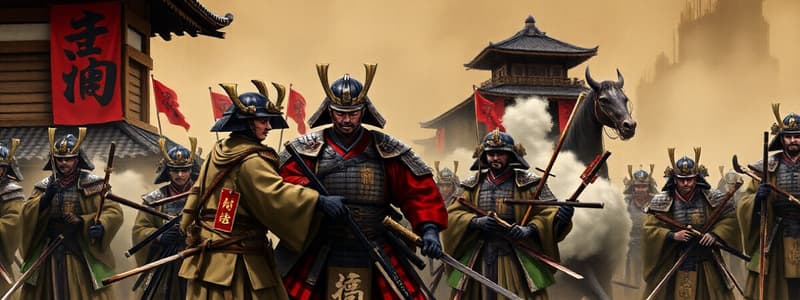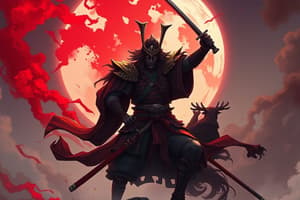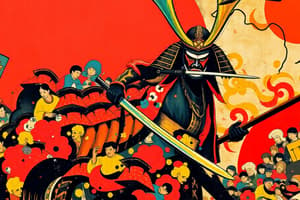Podcast
Questions and Answers
In feudal Japan, how did the roles of the Emperor and the Shogun differ?
In feudal Japan, how did the roles of the Emperor and the Shogun differ?
- The Emperor served as a figurehead with no real influence, while the Shogun managed cultural events.
- The Emperor controlled the military, while the Shogun managed religious affairs.
- The Emperor was responsible for economic policy, while the Shogun oversaw judicial matters.
- The Emperor held symbolic authority, while the Shogun wielded actual political power. (correct)
Which group directly supported the daimyo's power through military service and protection of territory?
Which group directly supported the daimyo's power through military service and protection of territory?
- The Shogun
- The Burakumin
- The Peasants
- The Samurai (correct)
How did land ownership primarily affect social status in feudal Japan?
How did land ownership primarily affect social status in feudal Japan?
- Land ownership allowed individuals to bypass the social hierarchy and gain immediate political power.
- Land ownership and proximity to land were directly correlated with one's importance in society. (correct)
- Land ownership determined the professions one could pursue within the social structure.
- Land ownership determined access to religious ceremonies and spiritual guidance.
Why were peasants (farmers) considered a respected social class despite bearing a heavy tax burden?
Why were peasants (farmers) considered a respected social class despite bearing a heavy tax burden?
Which statement accurately describes the role of the 'untouchables' in the Japanese caste system?
Which statement accurately describes the role of the 'untouchables' in the Japanese caste system?
Flashcards
Emperor (Feudal Japan)
Emperor (Feudal Japan)
The symbolic figurehead with no real political power.
Shogun (Feudal Japan)
Shogun (Feudal Japan)
The actual ruler of Japan, holding political and military power.
Daimyo
Daimyo
Powerful lords who controlled territories and supported the shogun.
Samurai
Samurai
Signup and view all the flashcards
Peasants (Feudal Japan)
Peasants (Feudal Japan)
Signup and view all the flashcards
Study Notes
- In feudal Japan, the emperor was a symbol of power
- Political power was held by the shogun
- The shogun governed with the support of the daimyo
- The shogun acted as prime minister
- The power of the daimyo depended on the samurai
- Samurai protected territory and provided military assistance
- Land ownership determined people's importance
- Proximity to land determined position in society
- Peasants (farmers) paid most of the taxes
- Burakumin, the lowest caste, included actors, butchers, and entertainers
- Minority ethnic groups, the untouchables, were not recognized as part of the caste system
Studying That Suits You
Use AI to generate personalized quizzes and flashcards to suit your learning preferences.




